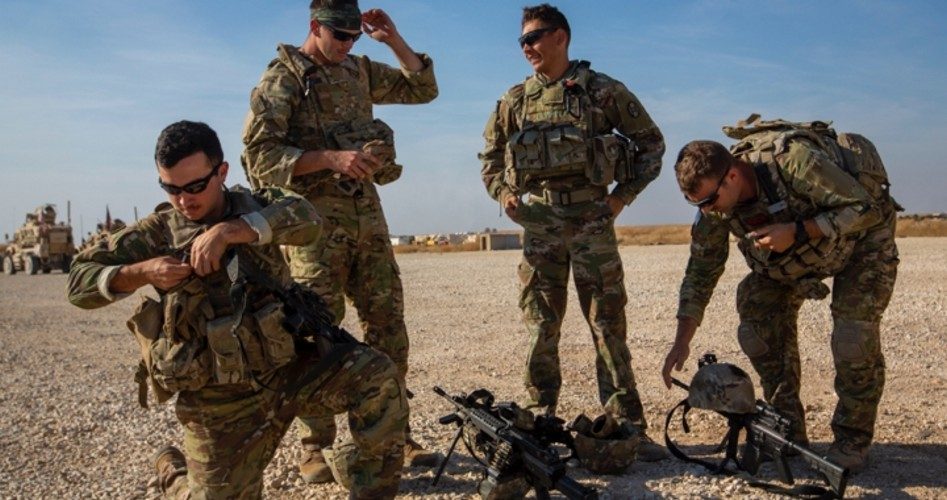
“Of all the enemies to public liberty war is, perhaps, the most to be dreaded, because it comprises and develops the germ of every other. War is the parent of armies; from these proceed debts and taxes; and armies, and debts, and taxes are the known instruments for bringing the many under the domination of the few. No nation could preserve its freedom in the midst of continual warfare.”
— James Madison
The government of the United States of America has spent almost $6 trillion on global combat actions, operations the prosecution of which has killed nearly 500,000 people, since the attacks of September 11, 2001.
A report published November 13 by Brown University’s Watson Institute for International and Public Affairs reveals the precise cost of continuing to be the world’s military branch across the 18 years of spending on war, materiel, salary for the members of the armed forces, benefits for veterans of those wars, interest paid on the debts incurred by the various government agencies to prosecute the war, the various anti-terrorism policies, the personnel that enforce those policies, and other slush funds set aside for military intervention overseas.
“The United States has appropriated and is obligated to spend an estimated $5.9 trillion (in current dollars) on the war on terror through Fiscal Year 2019, including direct war and war-related spending and obligations for future spending on post 9/11 war veterans.”
“In sum, high costs in war and war-related spending pose a national security concern because they are unsustainable,” the report surmised. “The public would be better served by increased transparency and by the development of a comprehensive strategy to end the wars and deal with other urgent national security priorities.”
Ending all the foreign combat missions — none of which is incident to a declaration of war as required by the Constitution — would save trillions of dollars and hundreds of thousands of lives. While Newsweek recommends we take the savings and pour it into “other urgent national security priorities,” I would suggest we return that money to the men and women of America from whom it was taken in the first place.
For those of us concerned with the Constitution, due process, and the rule of law, the way the United States is prosecuting this “war” demonstrates to the world and to our own people that with regard to our concern for human life, we are no better than those we kill in the name of safety.
While we continue to kill in the name of peace, we have learned that the higher the body count of “terrorists,” the more rapid and wide is the growth of anti-American sentiment worldwide.
Those slated for assassination are not allowed any rights — neither the due-process rights given to those accused of crimes nor the rights of fair treatment given to enemies captured on the battlefield.
For nearly two decades, the White House has assumed all power over life and death — at home and abroad — and has created a brand-new category of individual: one who can be indiscriminately deprived of all rights altogether.
For decades, American presidents have assumed the authority to deploy the U.S. military into battle, with combat operations being carried out on scores of battlefields across the globe.
As a matter of fact, Congress has not declared war since WWII.
Since the ratification of the current Constitution, the U.S. Congress has formally declared war on 11 occasions as part of five wars: first, the War of 1812; second, the Mexican-American War (1846); third, the Spanish-American War (1898); fourth, World War I (1917); and, finally, as mentioned above, World War II (1941 and 1942).
Since WWII, then, there have been no “wars,” but there have been thousands of American soldiers, sailors, marines, and airmen killed in combat, usually having been sent into harm’s way by the president acting alone.
Despite efforts over the years by presidents from both major political parties to prove the existence of executive war powers, the black letter of the Constitution, as well as the history of that document’s drafting and ratification, makes the locus of war-making power clear: Congress possesses the exclusive power to declare war.
It is true that before putting “boots on the ground” in any of the theaters of combat opened in the last 77 years, Congress could have declared war had the representatives and senators wished to do so. But they have not done so and don’t appear likely to resume the practice anytime soon.
As for how wide and far U.S. forces are spread around the world, there were about 1.3 million total active-duty U.S. military personnel in 2016. Of these, 193,442 — or 15% — were deployed overseas, according to a Pew Research Center analysis of information from the Defense Manpower Data Center, a statistical arm of the Department of Defense.
Is it not apparent that as we deploy our armed forces from pole to pole and on every port on all the seven seas that they will more often be in harm’s way, even when they are not knowingly placed there by the Pentagon?
As we waste our money and our youth on unconstitutional combat operations and the infrastructure that supports them, we are creating generational debt and generational instability, mentally and militarily.
Americans who care more for the Constitution than for conquest can contact their congressmen and encourage them to resume their constitutional authority to be the sole decider of when our young men and women are sent into harm’s way and how much of the hard-earned money of our people should be spent on those operations.
Photo: AP Images
Joe Wolverton II, J.D., is the author of the book The Real James Madison and his second book, What Degree of Madness: Federalist 46 and James Madison’s Call to Make America STATES Again, will be published this fall, along with a book about the forgotten influences on the Founding Fathers.


